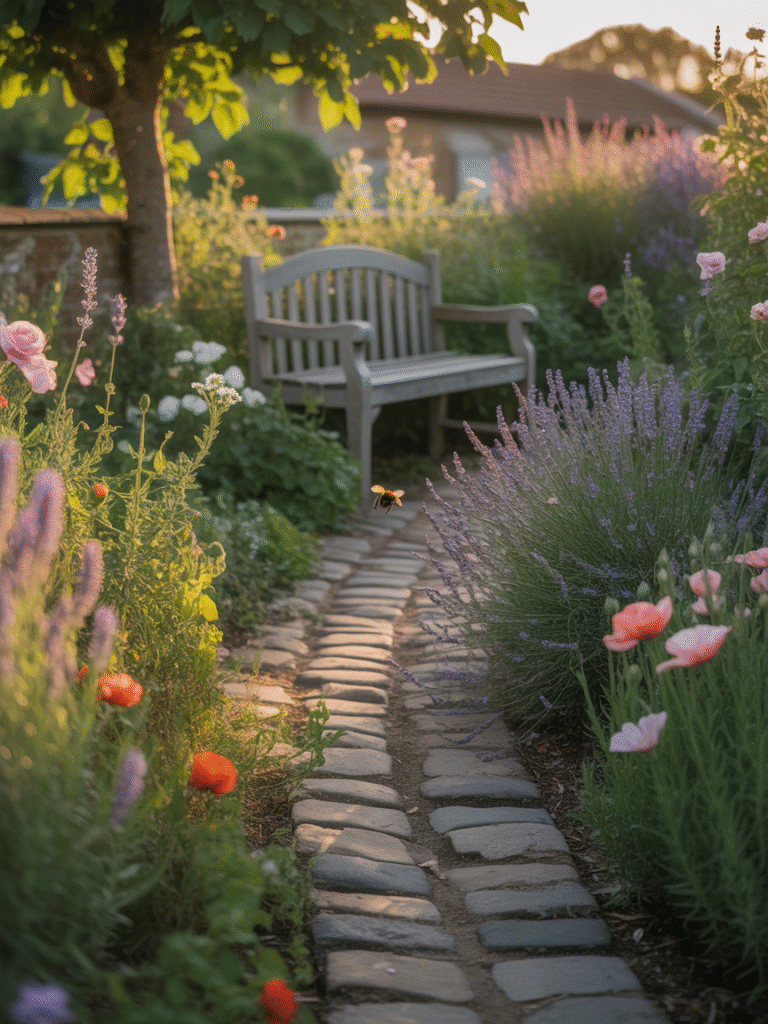I was chatting to my neighbour fence last week, sharing tips about my tomatoes, when she said something that stopped me cold: “You should write all this down somewhere. People would pay for advice like yours.” That’s when it hit me. Maybe my little summer adventures could be more than just pleasant memories.
If you’re in your 50s or 60s, maybe eyeing retirement or already enjoying more free time, summer is the perfect season to explore blogging. You don’t need to be a tech wizard. You just need your stories, a bit of curiosity, and a willingness to share what you’ve learned along the way.
When I started my blog about container gardening, my first post was about the disaster I made trying to grow herbs on my kitchen windowsill. That failure got more comments than any perfect success story I’ve shared since. Turns out, people love honesty more than perfection.
“But I’m Not a Writer” (And Other Worries)
Let me guess what you’re thinking: “I can barely send an email without my grandchildren’s help.” I felt exactly the same way. The truth is, you don’t need to be Shakespeare. You just need to be yourself.
When I published my first post about repotting plants, I was convinced I’d made dozens of mistakes. But the comments that came in weren’t pointing out errors. They were thanking me for being honest about the mess I’d made of my potting bench.

Your life experience is worth more than you think. While twenty-somethings are sharing their first attempts at everything, you’re sharing tried and tested wisdom. That’s gold to readers who want practical solutions that actually work.
Tools and Platforms to Get Started
The technical side doesn’t have to be scary. I promise you can do this, even if you consider yourself “not computer-minded.” Let’s start with the basics and work our way up gently.
Keep It Simple
Getting your own web address sounds terrifying, doesn’t it? I thought so too. But it’s honestly no harder than ordering something online. You type in what you want (like ‘sarahsgardenchat.co.uk’), pay about £10 for the year, and you’re done. I did mine whilst having my morning tea.
If you want to jump in quickly, you can try Blogger. It’s linked to your Google account and you can start within minutes. I don’t use, nor have ever used, Blogger so can’t really comment on it. Just know that it is an option.
If you prefer more control over how your blog looks, WordPress is a solid options. For hosting, try SiteGround or Bluehost. They offer proper support and start around £3 to £7 a month. Don’t worry, they often help you install WordPress with one click. I remember thinking I’d break the internet when I first tried this. Spoiler alert: I didn’t.
Must-Have Helpers
Use Grammarly to polish your writing and Canva to design eye-catching images. I still chuckle remembering my early blog photos. Wonky, blurry, and clearly taken with a shaky hand. Canva saved me from myself with simple templates that make everything look intentional.
On WordPress, the free Yoast SEO plugin helps your blog posts get noticed in Google. Both Blogger and WordPress let you schedule posts ahead of time, so you can still enjoy the sunshine without neglecting your blog.

Choosing What to Blog About
The beauty of starting a blog later in life is that you already have so much to draw from. You don’t need to find your niche because you probably already live in it.
Start With What You Know
Think about what lights you up: gardening tips, local travel, meal prepping, DIY hacks, family organising. Don’t try to mimic younger bloggers. Your strength is your experience, your perspective, and your hard-won knowledge.
Last summer, I wrote about making the world’s simplest fruit salad for a picnic. Nothing fancy, just what I had in the fridge. That post still brings in readers months later because it solved a real problem: what to bring when you’re asked to “just bring something.”
Real-Life Inspiration
Mary, 66, started a blog about container gardening after her back made traditional gardening difficult. Now she earns £400 a month sharing raised bed solutions. Jim blogs about budget travel for over-50s, focusing on accessible destinations and senior discounts. They stuck with what they knew and slowly built loyal audiences.
You don’t have to go viral to succeed. You just need to connect with the right readers who value your particular brand of wisdom.
👇 Pause and Think: What do you already enjoy talking about or helping friends with? That could be the perfect blog topic.
Test the Waters
Google your topic ideas and check what people are searching for. Pop into local Facebook groups or Mumsnet threads related to your interests. Look at other blogs and read the comments. Those questions might give you endless post ideas.
Setting Up Your Blog
This is where many people get stuck, but it’s honestly simpler than it seems. Think of it like setting up house somewhere new, just digitally.
Your Online Home
Getting hosting feels like a big step, but think of it like renting a small plot for your thoughts. SiteGround and Bluehost both offer lovely customer service (with real people who speak clearly), and they’ll often set everything up for you if you ask nicely.
Pick a clean, simple theme like “Twenty Twenty-Three” or “Astra” on WordPress. Especially if your blog includes photos, it’s worth choosing a design that makes them shine. I spent days agonising over themes before realising that simple usually wins.
Pages to Include
About: Who are you and why are you blogging? This is where you share your story honestly. People want to know the real person behind the advice.
Contact: A form so readers can get in touch. You’ll be surprised how many lovely messages you’ll receive.
Privacy Policy & Cookie Notice: Most themes include these, and WordPress has templates specifically for UK sites. Don’t let this bit scare you off. It’s mostly legal housekeeping.

Writing Posts That Connect
This is where the magic happens. Writing for your blog isn’t like writing essays at school. It’s more like having a conversation with someone you want to help.
What to Write
Stick to seasonal ideas that feel natural: garden updates, beach packing tips for grandchildren’s visits, easy summer salads that won’t wilt in the heat. Add your personal spin to everything. A post about “my three easiest garden fixes” sounds more inviting than “garden tips.”
I once wrote about my disastrous attempt to grow cherry tomatoes in hanging baskets. The plants died, the baskets fell, and I made a right mess of the patio. That post got shared more than any of my success stories because everyone could relate to garden failures.
Plan Ahead
Draft seasonal posts a few weeks early. Create a simple content calendar with ideas for the month. I use a notebook by the kettle and jot down ideas while waiting for the tea to brew. Mix evergreen posts (that work year-round) with time-sensitive ones.
Summer content works beautifully because people are actively gardening, planning holidays, and trying new recipes. Write about what you’re actually doing, not what you think you should be doing.
Make It Easy to Read
Start each post with what the reader will gain. Break things into chunks with subheadings. Use real photos, not perfect ones, just yours. That wonky shot of your prize-winning roses tells a better story than any stock photo could.
Growing Your Audience
Building an audience takes time, but it’s one of the most rewarding parts of blogging. You’re not just gaining readers; you’re building a community of like-minded people.
Social Media That Works
Focus on Facebook and Pinterest. These platforms suit our age group perfectly. Join relevant Facebook groups like UK Gardeners, Over 50s Travel, or local community groups. Participate genuinely before sharing your own content.
On Pinterest, create summer-themed images using Canva and link them to your posts. British gardening content performs beautifully on Pinterest, especially if you include seasonal timing specific to our unpredictable climate.
Collect Emails Early
Offer a freebie: maybe a printable garden planner, packing checklist for seaside trips, or seasonal recipe cards. Use MailerLite to collect addresses and send friendly monthly updates.
Think of it as starting a pen pal relationship with people who genuinely want to hear from you. Much nicer than shouting into the social media void.
Be Social
Leave thoughtful comments on similar blogs. Reply to every comment on your blog, even if it’s just to say thank you. Join communities like UK Bloggers or Silver Bloggers to find support and collaboration opportunities.
The best part? You’ll find your people. There’s something magical about getting a comment from someone in Cornwall who tried your recipe, or a message from a reader in Scotland asking about adapting your garden tips for their climate. These aren’t just readers; they become friends.
Earning from Your Blog
Let’s talk about the practical side: making some money from your efforts. Don’t expect riches overnight, but a steady side income is definitely achievable.
Starting Simple
Begin with Google AdSense or Amazon Associates. Share honest reviews of products you already use. I started by reviewing the gardening tools I actually reached for most often. Nothing fancy, just honest opinions about what worked and what didn’t.
As your traffic grows, apply to better-paying ad networks like Mediavine. But don’t rush this bit. Focus on building trust with your readers first.
Try Selling Something
Printables like summer planners, garden journals, or recipe cards are easy digital products. Use Canva to create them and start with low prices. £5 to £15 sells well and feels accessible to most readers.
Keep Expectations Real
Blog income usually takes 6 to 12 months to materialise properly. Focus on consistency and trust building. A few hundred pounds a month is very achievable over time, and that can make a real difference to your monthly budget.
I started my blog on a rainy Tuesday in July, convinced nobody would read it. Six months later, I’m still going, and that’s the hard bit.
Let’s Be Honest About the Hard Bits
Some days, you’ll stare at a blank screen wondering what on earth to write about. I once spent an entire afternoon trying to describe how to water hanging baskets and ended up deleting the whole thing. The words just wouldn’t come, and that’s perfectly normal.
Other days, you’ll publish something you’re proud of and hear nothing but crickets. That post you spent ages crafting? Sometimes it flops. Even the most successful bloggers have posts that sink without trace.
The technical stuff can feel overwhelming too. I’ve accidentally deleted entire posts, published drafts by mistake, and once somehow turned my entire blog purple for three days. But here’s the thing: it’s all fixable, and there’s always someone in a Facebook group who’s made the same mistake and can help.
Staying Safe Online
The internet can feel like the Wild West sometimes, especially when money’s involved. Here’s how to protect yourself from the cowboys.
Avoid the Scams
If it promises overnight income, it’s probably a scam. I learned this after nearly falling for a “make £1000 in your first month” course that turned out to be completely useless. Don’t pay to join a network that wants you to “apply” for sponsored posts. Legitimate opportunities don’t require upfront payments.
Be cautious with expensive courses unless you can find real reviews and guarantees. The internet is full of people trying to sell dreams to bloggers. Trust your instincts.
Check Before Spending
Look up instructors, ask questions in forums, and only buy from sources that feel transparent. Free resources can get you surprisingly far. I learned more from free YouTube videos and blog posts than I ever did from paid courses.

Making Time for Blogging
One of the biggest concerns I hear is “I don’t have time for another commitment.” The lovely thing about blogging is that it can fit around your existing life beautifully.
Keep It Manageable
Blogging can fit around your life beautifully. Try writing in 90-minute blocks twice a week. I find early morning works best, with a proper cup of tea and the garden visible through the window for inspiration.
Some bloggers write more in winter and schedule posts for summer when they’d rather be outside. Find what works for your rhythm and stick to it.
Batch and Balance
Take photos on Monday, draft on Wednesday, edit on Friday. Keep a notebook nearby to jot ideas while you’re out or enjoying your cuppa in the garden. I’ve written some of my best posts based on conversations overheard in the garden centre queue.
The beauty of blogging at our age is that we don’t have to hustle like the younger crowd. We can take our time, think things through, and share wisdom rather than just enthusiasm.
Common Hurdles (And How to Leap Them)
Every new blogger faces the same challenges. Knowing what they are ahead of time makes them much easier to handle when they crop up.
Not Tech-Savvy? No Worries
Use guides from WPBeginner or YouTube to follow along step by step. Facebook groups are brilliant for quick help. Screenshot your problem and ask for advice. You’ll be surprised how helpful people can be, especially to fellow over-50s bloggers.
We’re learning new skills, not trying to prove we know everything already.
Writer’s Block?
Start by telling a story. Share what happened last weekend or what you tried in the kitchen. Honesty matters more than perfection, and your readers want to hear about real life, not polished perfection.
Write like you’re chatting to a friend over the garden fence. That’s the voice people want to hear.
Set Realistic Goals
Start with one post every two weeks. Celebrate small wins like uploading your first image or getting your first comment from a stranger. I still remember the thrill of my first comment that wasn’t from family members.
Build slowly and enjoy the process. This isn’t a race.
Inspiring Stories
Sarah, 68, turned her Mediterranean holiday recipes into a blog after retirement. She now makes £500 a month from a digital cookbook and monthly online cooking workshops. What started as sharing holiday memories became a proper side income.
Linda, a retired teacher, blogs about easy walks accessible to people with mobility issues. She earns through affiliate links to walking gear and partnerships with local tourism boards. Her honest reviews of walking boots alone bring in £200 a month.
These women didn’t start with massive followings or technical expertise. They started with stories and stuck with it.
Your Next Cup of Tea Assignment
Before you finish your next cup of tea, do this: write down three things you did this week that someone might find helpful. Maybe you found a better way to store your gardening gloves, discovered which supermarket has the best value flowers, or worked out how to keep slugs off your hostas.
That’s your first three blog posts right there, waiting to be written.

Final Thoughts
You don’t need a tech degree or a huge following to start a summer blog. Just your stories, some curiosity, and the willingness to learn bit by bit. The best blogs are the honest ones, the ones that feel like a chat over tea with someone who understands your world.
Not bad for someone who still asks her son to help with the tablet, eh?
What’s the one thing you know that you wish someone had told you years ago? That’s probably your first blog post waiting to happen. Pop a comment below and tell me about it. I’d love to hear your ideas, and I bet other readers would find them helpful too.
